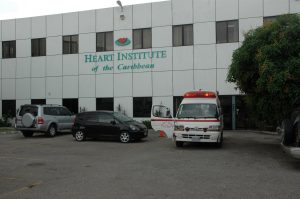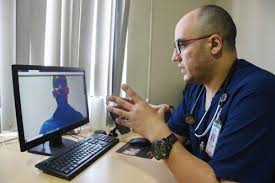

[Reprinted: Jamaica Observer, 6-28-2020]
Patients at the Heart Institute of the Caribbean (HIC) have been getting used to the practice of consulting with their doctors online.
The use of information technology software and electronic communication to provide remote clinical services to patients, or what is called telemedicine, has rapidly increased since the novel coronavirus pandemic with curfew and social distancing restrictions.
And although the use of telemedicine at HIC has been there from the very founding of the institution in 2005, consulting cardiologists who spoke with the Jamaica Observer last week, say more of their patients, especially the elderly, are now opting for virtual consultations.
“This is definitely a faster way to get consultations done with our patients,” Dr Soliman Hegazy, consultant interventional cardiologist, told the Sunday Observer.
“We are proudly the first in this field to use the telemed platform. We started getting in touch with our stable patients first, to assess them and we have found this very useful. It’s not like the physical consultation but at least we are in a situation that we can know exactly if the patient needs to come in or not,” he added.
“We also started to provide more services, like providing prescriptions online. If a patient is stable and just needs a refill, our pharmacy here can provide the prescription on WhatsApp for example and then a relative of the patient can come get the medication.”
Dr Hegazy said the virtual consultations have been especially helpful for many elderly patients who are instructed not to come out of the house unless it is a medical emergency.
“That was some advancement and the platform itself is starting to become a lot more advanced because the demand has become more,” Dr Hegazy said, referring to the Netmedical Telemedicine portal, a customised telemedicine platform for physicians at HIC.
The technology is made available in Jamaica because of the robust partnership between HIC and NetMedical New Mexico, the leading telemedicine service provider in the USA.
And just as with physical consultations, telemedicine requires the patients to call the hospital and set an appointment for the virtual consultation.
“With this [virtual consultations] I can determine which symptoms require a patient to come to the hospital or to stay at home and just take the medication. It is like triaging the patients; identifying those with severe to moderate or mild symptoms and then determine if there is any need to come to the hospital,” said Dr Hegazy.
Along with telemedicine, the Heart Institute has also been employing the use of a mobile echocardiogram device to better serve their patients wherever they are located. The Butterfly probe is one such.
“This is a new, innovative technology that we are using to check patients’ heart rate. It’s a simpler technology than a physical echo machine, which is a huge device that is not easy to carry around. With this technology I can go anywhere and check any patient anywhere in the hospital, in the ER or outside if I need to make sure that the heart is good or not,” Dr Hegazy explained.
The device is also paired to a cloud-sharing platform allowing doctors to access the readings online.
Dr Edwin Tulloch-Reid, also a consultant cardiologist and director of clinical services at the Heart Institute, said the use of integrated technology in medicine has “broadened access and democratised cardiac care” in Jamaica.
“We have had telemedicine from the start, which has helped us prepare for the COVID epidemic. We are accustomed to electronic medical records and having remote access. So times when we were restricted by curfew hours or we couldn’t always be in office, we were able to still function.
“It means also that we can have physicians elsewhere assisting us in terms of consultations or maybe second opinions. Telemedicine allows us to make the study available, like an echocardiogram or an ECG or stress test report, to a cardiologist in the US or Canada,” said Dr Tulloch-Reid, adding that patients have readily embraced the use of technology in receiving health care.
“It has been received very well. In fact I had a patient who is in her 90s and because of COVID she was reluctant to get out. But with the telemedicine all of her relatives could all be present for the consultation,” Dr Tulloch-Reid shared ecstatically.
He also explained that while there will always be need for an initial physical consultation with patients, all follow-ups can be done remotely with the use of telemedicine technology as more advancement is made in that area.
“Most of the information doctors get is from the patient’s history and much less from physical examination. We need to image the heart or get an ECG. That is a lot more useful to us than listening with a stethoscope. So providing that we have the right imaging tools and the right imaging information, we don’t need a lot of physical examination. So the patients do not lose anything from a remote consultation.
“Only with new patients there would be the need for an initial physical examination but follow-up’s are much better done remotely, and this will become more and more prevalent as the technology advances and as we progress beyond COVID-19,” said Dr Tulloch-Reid.